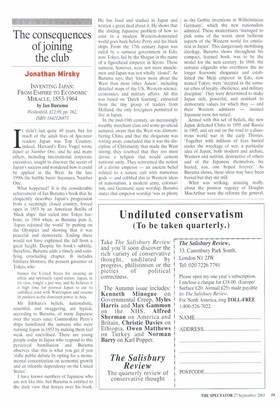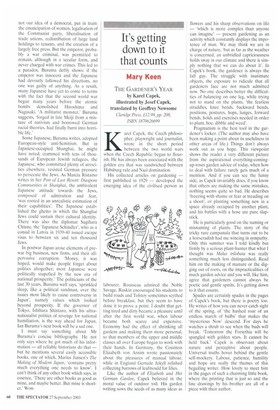The consequences of joining the club
Jonathan Mirsky
INVENTING JAPAN: FROM EMPIRE TO ECONOMIC MIRACLE, 1853-1964 by Ian Buruma Weidenfeld, £12.99, pp. 162, ISBN 1842126873 It didn't last quite 40 years, but for much of the adult lives of Spectator readers Japan was Top Country; indeed, Harvard's Ezra Vogel wrote Japan as Number One, and he and many others, including international corporate executives, sought to discover the secret of Japan's success and wondered how it could be applied in the West. In the late 1990s the bubble burst: Sayonara, Number One.
What happened? It is the considerable achievement of Ian Buruma's book that he eloquently describes Japan's progression from a seemingly closed country, forced open in 1853 by an American flotilla of 'black ships' that sailed into Tokyo harbour, to 1964 when, as Buruma puts it, 'Japan rejoined the world' by putting on the Olympics and showing that it was peaceful and democratic. Ending there would not have explained the fall from a great height. Despite his book's subtitle, therefore, Buruma adds a timely and satisfying concluding chapter. It includes Ishihara Shintaro, the present governor of Tokyo, who blames the United States for creating an effete and spiritually vapid nation. Japan, in his view, fought a just war, and he believes it is high time for postwar Japan to cut its umbilical cord with Washington and resume its position as the dominant power in Asia.
Mr Ishihara's beliefs, nationalistic, resentful, and swaggering, are typical, according to Buruma, of many Japanese over the years since Commodore Perry's ships humiliated the samurai who were running Japan in 1853 by making them feel weak and uncivilised. There are young people today in Japan who respond to this perceived humiliation and Buruma observes that this is what you get if you 'stifle public debate by opting for a monumental concentration on economic growth and an infantile dependency on the United States..
I have known numbers of Japanese who are not like this, but Buruma is entitled to the dark view that hovers over his book. He has lived and studied in Japan and written a great deal about it. He shows that the abiding Japanese problem of how to exist in a modern Western-dominated world goes back before Perry and his black ships. From the 17th century Japan was ruled by a samurai government in Edo, now Tokyo, led by the Shogun in the name of a figurehead emperor in Kyoto. These samurai, however, were not mere musclemen and Japan was not wholly 'closed'. As Buruma says, they 'knew more about the West than most other Asians', including detailed maps of the US. Western science, economies, and military affairs. All this was based on 'Dutch learning', extracted from the tiny group of traders from Holland, the only foreigners permitted to live in Japan.
In the mid-19th century, an increasingly wealthy merchant class and some go-ahead samurai, aware that the West was dismembering China and that the shogunate was rotting away, concluded that it was the discipline of Christianity that made the West strong; they resolved that they too must devise a religion that would cement national unity. They reinvented the notion of a divine emperor — an ancient belief related to a nature cult with numerous gods — and cobbled this to Western ideas of nationalism, a modern army, colonialism, and Germanic state worship. Buruma states that emperor worship 'was as phony as the Gothic inventions in Wilhelminian Germany', which the new nationalists admired. These modernisers 'managed to pick some of the worst, most bellicose aspects of the Western world for emulation in Japan'. This dangerously mobilising ideology, Buruma shows throughout his compact, learned book, was to be the model for the next century. In 1868, the samurai oligarchs who overthrew the no longer fearsome shogunate and established the Meiji emperor in Edo, now named Tokyo, were "steeped in the samurai ethos of loyalty, obedience, and military discipline'. They were determined to make Japan rich, powerful, and resistant to democratic values for which they — and their Western admirers — insisted Japanese were not suited.
Armed with this set of beliefs, the new Japan defeated China in 1895 and Russia in 1905, and set out on the road to a disastrous world war in the early Thirties. 'Together with millions of lives buried under the wreckage of war, a particular idea of Japan, both modern and archaic, Western and nativist, destructive of others and of the Japanese themselves, lay buried, too, one hoped forever.' As Buruma shows, these ideas may have been buried but they stir still.
What was striking, amazing really, about the postwar regency of Douglas MacArthur were the reforms the general, not our idea of a democrat, put in train: the emancipation of women, legalisation of the Communist party, liberalisation of trade unions, redistribution of large land holdings to tenants, and the creation of a largely free press. But the emperor, proba
bly a war criminal, was permitted to remain, although in a secular form, and never charged with war crimes. This led to a paradox, Buruma deftly shows: if the emperor was innocent and the Japanese had devoutly followed his directions, no one was guilty of anything. As a result, many Japanese have yet to come to terms with the fact that the second world war began many years before the atomic bombs demolished Hiroshima and Nagasaki. 'A militarist monster,' Buruma suggests, 'forged in late Meiji from a mixture of nativism and borrowed German racial theories, had finally burst into horrible life.'
Some Japanese, Buruma writes, adopted European-style anti-Semitism. But in Japanese-occupied Shanghai, he might have noted, crammed with tens of thousands of European Jewish refugees, the Japanese, who committed plenty of atrocities elsewhere, resisted German pressure to persecute the Jews. As Marcia Ristaino writes in her Port of Last Resort: Diaspora Communities in Shanghai, the ambivalent Japanese attitude towards the Jews, composed of admiration and fear, 'was rooted in an unrealistic estimation of their capabilities'. The Japanese established the ghetto in which the Shanghai Jews could sustain their cultural identity. There was also the diplomat Sugihara Chiune, the 'Japanese Schindler', who as a consul in Latvia in 1939-40 issued escape visas to between six and ten thousand Jews.
In postwar Japan arose elements of prewar big business, new firms, and their allpervasive corruption. 'Money, it was hoped, would make people forget about politics altogether; most Japanese were politically stupefied by the new era of national prosperity.' The politicians of the last 30 years, Buruma well says, 'sprinkled sleep, like a political sandman, over the issues most likely to cause controversy in Japan', namely values which looked beyond prosperity. If the governor of Tokyo, Ishihara Shintaro, with his ultranationalist politics of revenge for national humiliation, is the way ahead for Japan, Ian Buruma's next book will be a sad one.
I must say something about Mr Buruina's concise bibliography. He not only says where he got much of his information — all reliable historians do that — but he mentions several easily accessible books, one of which, Marius Jansen's The Making of Modem Japan, 'contains pretty much everything one needs to know'. I can't think of any other book which says, in essence, 'There are other books as good as mine, and maybe better. But mine is shorter.' Wow.



























































































 Previous page
Previous page